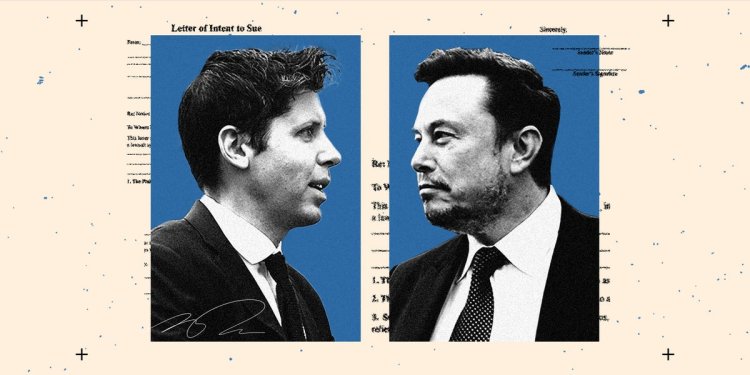Elon Musk just threw down the gauntlet at Sam Altman, and there's no going back
Elon Musk's case against OpenAI may be weak, but the AI venture could still pay a hefty price, experts say.

Nathan Howard/Getty, Tyler Le/BI
- Elon Musk is suing OpenAI and its CEO, Sam Altman, years after leaving the startup.
- Despite Musk's allegations, legal experts say his case against OpenAI appears weak.
- But Musk's lawsuit could still hamper OpenAI, tying it up in court and airing dirty laundry.
It was last May, and Elon Musk was sitting down for an interview with CNBC's David Faber.
When asked about Altman and OpenAI, Musk grew visibly frustrated.
"It wouldn't exist without me," Musk said.
"It does seem weird that something can be a nonprofit, open-source and somehow transform itself into a for-profit, closed source," he added. "That's the exact opposite of what I gave them the money for. Is that legal? It doesn't seem legal."
Musk's answer may have been the writing on the wall that the billionaire was ready to take Altman and OpenAI to court.
On Thursday, Musk sued OpenAI and its CEO, claiming that the company's partnership with Microsoft violated its mission by putting profit ahead of creating open-source technology that would benefit humanity.
The two had beefed before, and Altman had been more diplomatic in his answers publicly when asked about Musk, even calling the Tesla CEO his hero.
But now, Musk has thrown down the gauntlet, likely marking a point of no return for their relationship as he seeks in his lawsuit to force OpenAI to make its research and technology open-source, cut off Microsoft from GPT-4, and prevent Altman and Microsoft from benefiting from the company.
"It seems like he's trying to slow them down so he can catch up on his own efforts," Kyle Lawrence, a corporate and securities lawyer at Falcon Rappaport & Berkman, told Business Insider. "That's how a lot of the big tech giants operate. They succeed by throttling other institution's ability to move forward."
After all, Musk is far from a disinterested party.
Musk's lawsuit comes after the billionaire launched his own AI company last year. Musk has said he invested tens of millions of dollars into OpenAI during its founding but walked away from the company's board in 2018.
At the time, Musk said he'd left to avoid a potential conflict of interest with Tesla and its AI efforts.
A weak case
Despite Musk's grandstanding, his case against OpenAI appears shaky at best, David Hoffman, a contract law expert from the University of Pennsylvania, said.
"It would be very difficult to claim a breach of contract without a written contract," Hoffman said.
Musk's case argues that OpenAI has strayed from its "founding agreement," but there doesn't appear to be such a written agreement. The complaint relies on unwritten contract claims, which will be difficult to hold up in a court of law, Hoffman said.
Instead, Musk's case cites an email from Altman (which appears to be more of a casual negotiation than a contract) and the OpenAI's certificate of incorporation (which Musk didn't sign and doesn't mention keeping the company open source).
And because OpenAI is a non-profit it will be difficult for the billionaire to claim OpenAI's board has any fiduciary duties to him, Samuel Brunson, a nonprofit legal expert from Loyola University, told Business Insider.
The billionaire's argument regarding OpenAI's failure to act for the "benefit of humanity" is more of a philosophical one than a tangible legal argument, Kyle Lawrence, a corporate and securities lawyer from Falcon Rappaport & Berkman, said.
"Who's to say that what they're doing isn't benefiting humanity?" Lawrence said. "They could easily say they need a billion dollars to do that, and who's to say that the mechanism they put in place to get that billion dollars is in conflict with their goal of benefiting humanity?"
OpenAI could pay a hefty price
While experts say it's unlikely Musk's case would succeed, OpenAI may still pay a price.
"These types of lawsuits can air a lot of dirty laundry and it can be a major distraction that could impact their day-to-day operations," Hoffman said.
The publicity around the lawsuit — whether Musk wins or loses — could also damage OpenAI's reputation — fueling the fire lit when Altman was briefly ousted. As one of the richest men in the world, Musk could tie OpenAI up in litigation for years, according to Lawrence.
The case could also set a dangerous standard — if Musk were to pull out a win.
"If Musk were to win this case, it would set a bad precedent for non-profits everywhere," Brunson said. "You could start seeing a bunch of disaffected donors coming forward trying to get their money back, and most nonprofits don't have the same resources as OpenAI."
What's Your Reaction?




















